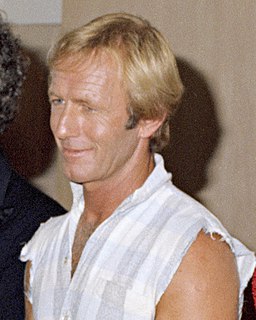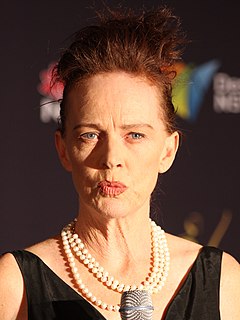- This is a chronological list of Australian films by decade and year for the 1990s. For a complete alphabetical list, see Category:Australian films .
A list of films produced in Australia by year during the 1990s, in the List of Australian films.
A list of films produced in Australia by year during the 1990s, in the List of Australian films.

Nicole Mary Kidman is an American and Australian actress and producer. Known for her work across various film and television productions from several genres, she has continuously remained one of the world's highest-paid actresses. She is the recipient of numerous accolades, including an Academy Award, a British Academy Film Award, a Screen Actors Guild Award, two Primetime Emmy Awards and six Golden Globe Awards.

The cinema of Australia had its beginnings with the 1906 production of The Story of the Kelly Gang, arguably the world's first feature film. Since then, Australian crews have produced many films, a number of which have received international recognition. Many actors and filmmakers with international reputations started their careers in Australian films, and many of these have established lucrative careers in larger film-producing centres, such as the United States.

Paul Hogan is an Australian actor, comedian, film producer and writer. He was nominated for the Academy Award for Best Original Screenplay and won the Golden Globe Award for Best Actor – Motion Picture Musical or Comedy for his performance as outback adventurer Michael "Crocodile" Dundee in Crocodile Dundee (1986), the first in the Crocodile Dundee film series.

Flirting is a 1991 Australian coming-of-age comedy drama film written and directed by John Duigan. The story revolves around a romance between two teenagers, and it stars Noah Taylor, who appears again as Danny Embling, the protagonist of Duigan's 1987 film The Year My Voice Broke. It also stars Thandiwe Newton and Nicole Kidman.

Archibald William Roach is an Aboriginal Australian musician. He is a singer, songwriter, guitarist, and a campaigner for the rights of Indigenous Australians. His musical and life partner was Ruby Hunter (1955–2010).
This is an index of lists of films by year, awards, countries of origin and genre among other factors.
The Australian New Wave was an era of resurgence in worldwide popularity of Australian cinema, particularly in the United States. It began in the early 1970s and lasted until the mid-late 1980s. The era also marked the emergence of Ozploitation, a film genre characterised by the exploitation of colloquial Australian culture.
The AACTA Award for Best Film is an award presented by the Australian Academy of Cinema and Television Arts (AACTA), a non-profit organisation whose aim is to "identify, award, promote, and celebrate Australia's greatest achievements in film and television". The award is presented at the annual AACTA Awards, which hand out accolades for achievements in feature film, television, documentaries and short films. From 1969 to 2010, the category was presented by the Australian Film Institute (AFI), the Academy's parent organisation, at the annual Australian Film Institute Awards. When the AFI launched the Academy in 2011, it changed the annual ceremony to the AACTA Awards, with the current award being a continuum of the AFI Award for Best Film.

The AACTA Award for Best Actress in a Leading Role is an award presented by the Australian Academy of Cinema and Television Arts (AACTA), a non-profit organisation whose aim is to "identify, award, promote, and celebrate Australia's greatest achievements in film and television".
The Australian Film Institute Award for Best Screenplay was an award presented intermittently by the Australian Film Institute (AFI), for an Australian screenplay written directly for the screen or based on previously released or published material. It was handed out at the Australian Film Institute Awards, which are now the AACTA Awards after the establishment of the Australian Academy of Cinema and Television Arts (AACTA), by the AFI. The award was handed out from 1975-1977, 1980-1982, 1990-1992, and again in 2007; two separate awards were created for "Best Adapted Screenplay" and "Best Original Screenplay" and have been presented intermittently from 1978-1979, 1983-1989, 1993-2006, and then from 2008, onwards. The award was first presented at the 1974-75 awards as a film prize which included a cash reward of $A1000.
The APRA Music Awards in Australia are annual awards to celebrate excellence in contemporary music, which honour the skills of member composers, songwriters, and publishers who have achieved outstanding success in sales and airplay performance.

Nigel John Dermot "Sam" Neill is a New Zealand actor, director, producer, and screenwriter.
The AACTA Award for Best Screenplay in Television is an award presented by the Australian Academy of Cinema and Television Arts (AACTA), a non-profit organisation whose aim is to "identify, award, promote and celebrate Australia's greatest achievements in film and television." The award is presented at the annual AACTA Awards, which hand out accolades for achievements in feature film, television, documentaries and short films. From 1986 to 2010, the category was presented by the Australian Film Institute (AFI), the Academy's parent organisation, at the annual Australian Film Institute Awards. When the AFI launched the Academy in 2011, it changed the annual ceremony to the AACTA Awards, with the current award being a continuum of the AFI Award for Best Screenplay in Television.
The AACTA Award for Best Young Actor is an award presented by the Australian Academy of Cinema and Television Arts (AACTA), a non-profit organisation whose aim is to "identify, award, promote and celebrate Australia's greatest achievements in film and television." The award is presented at the annual AACTA Awards, which hand out accolades for achievements in feature film, television, documentaries and short films. From 1991 to 2010, the category was presented by the Australian Film Institute (AFI), the Academy's parent organisation, at the annual Australian Film Institute Awards. When the AFI launched the Academy in 2011, it changed the annual ceremony to the AACTA Awards, with the current award being a continuum of the AFI Young Actors Award.
The AACTA Award for Best Original Screenplay is an award presented by the Australian Academy of Cinema and Television Arts (AACTA), for an Australian screenplay "written directly and originally for the screen". Prior to the establishment of the Academy in 2011, the award was presented by the Australian Film Institute (AFI) at the annual Australian Film Institute Awards. It was first handed out in 1978 when the award for Best Screenplay was split into two categories: Best Original Screenplay and Best Adapted Screenplay. The award has since been presented intermittently from 1978-1979, 1983-1987, 1989, 1993-2006, and then from 2008-present.
The Australian Film Institute Award for Best Foreign Film was an award presented by the Australian Film Institute (AFI), for a film made outside of Australia in English or non-English language. It was handed out at the Australian Film Institute Awards, which are now the AACTA Awards after the establishment of the Australian Academy of Cinema and Television Arts (AACTA), by the AFI. The Award was handed out from 1992–2004.
The 36th Australian Film Institute Awards were held in 1994. Presented by the Australian Film Institute (AFI), the awards celebrated the best in Australian feature film, television, documentary and short film productions of the year.